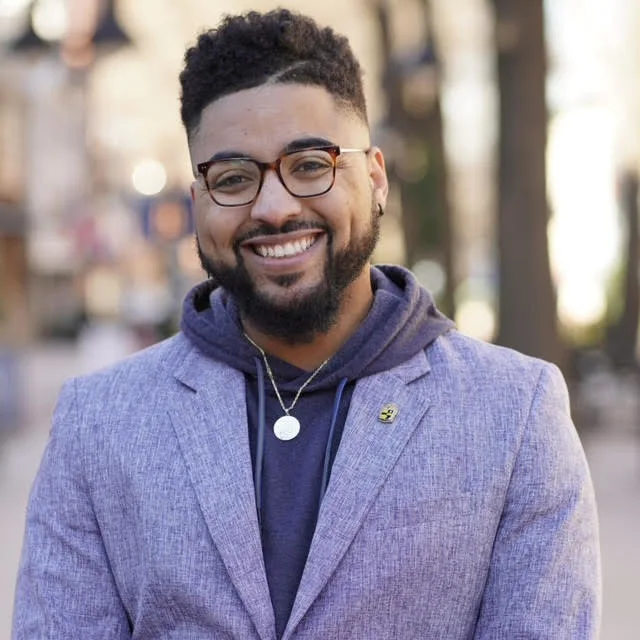Meet two men whose lives were changed by My Brother’s Keeper
A decade after its inception, the impact of My Brother's Keeper surpasses President Obama's original vision. Former mentees Noah McQueen and Jerron Hawkins serve as a testament, applying the program's service-oriented framework in all aspects of their current work.
In a recent interview, the men shared insights into how My Brother's Keeper shaped their lives and how they are now supporting the next generation of public servants. The conversation coincides with the celebration of the program's tenth anniversary and the ongoing construction of the Obama Presidential Center, our new home for change.
“My Brother’s Keeper literally changed the trajectory for what I thought was possible,” Noah reflected. “It gave me all the tools, resources, and surrounded me with love and supportive individuals who coached me toward my dreams.”
Ten years ago today, President Obama launched My Brother’s Keeper in response to Trayvon Martin's tragic death, with the goal to create safe and supportive communities for boys and young men of color and provide clear pathways to opportunity. A decade later, the MBK Alliance’s work is embedded in over 100 MBK Communities, impacting thousands of young men of color from Omaha to Chicago.
Noah and Jerron were among the first MBK mentees. Both young men were at a turning point in their lives when they joined the program and were facing critical life decisions. Noah was on a path to change after spending years in the juvenile justice system, but college didn't seem like an option. Jerron, who would soon become the first in his family to graduate high school, struggled to envision his next steps.
"I joined MBK at the tail end of my junior year of high school. In that year, Noah and I served as vice president and president of an organization that had a mentorship partnership with the nearby elementary school, Barack Obama Elementary School," Jerron shared. "We were told that the program was designed to provide an additional boost to young men already on an upward path. That's exactly what it did."
Jerron is continuing the MBK legacy as the policy advisor and internship coordinator for the Office of Community Relations Service in the U.S. Department of Justice. He is also the founder of a nonprofit that provides “last dollar” financial aid to students at Howard University.
“It’s my job to mentor and be a willing participant in my community,” Jerron explained. “President Obama’s call for a better and brighter future meant that people willingly volunteered their time to young people to ensure that future. I follow the same path, taking this responsibility personally because every person that comes after me should have less circumstances, more resources, and more access.”
Today, Noah is the founder of Lifting Our Voices, Inc. (LOV) (Opens in a new tab), a nonprofit committed to empowering the voices of the most vulnerable populations in communities across the nation through need-based service projects.
“The program shaped me at a time when I needed community the most. People loved on me in that space even when my upbringing made it hard for me to root for myself, have confidence, or dream big,” Noah explained.
He says his organization is rooted in the efforts of college students and the community.
“During the pandemic, I got a group of friends together and we just started feeding people out of my basement. The first week we made like a hundred meals and it grew to maybe 500 meals the next week. Today, we've given out over 80,000 meals in communities nationwide to people experiencing homelessness and food insecurity. LOV currently has eight chapters on college campuses nationwide and we hope to expand this year,” Noah shared.
Jerron and Noah credit their mentors for guiding and supporting them consistently throughout their journeys, leading to positive changes in their lives.
“It was such a beautiful mentorship that I carry till this day,” Noah shared. “MBK saved, enhanced, and bettered my life in so many ways. It prepared me to be a change agent in every room that I step in. They taught me awesome lessons about humility, togetherness, and what it really means to be a servant leader. I'm forever indebted to not just the organization, but the people in it.”
Even after completing the program, both men continued to support young people through MBK and in their own communities and organizations.
Jerron encourages all young leaders engaged in this work to "reach out and lean on others."
Noah’s advice for young people is to believe in themselves.
He shares, "You have to be committed to yourself, know what you want, and sometimes more importantly, what you don't want. Don't let anyone ever stop you from dreaming."
Noah and Jerron are just two examples among many that underscore the profound impact of MBK. The work, however, doesn't end here. MBK will continue its efforts for the next ten years and beyond, ensuring all boys and young men of color feel supported and cared for.






